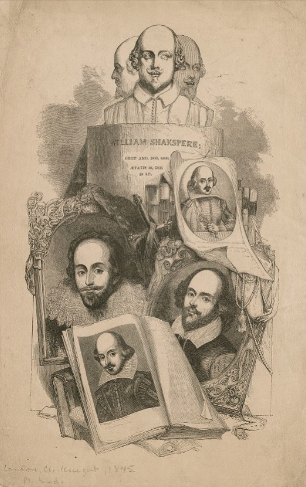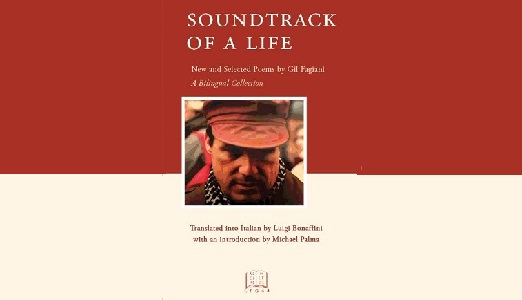Review by Laura Klinkon
Shakespeare in the “All the world’s a stage” speech from As You Like It ends the first line with “and all the men and women merely players.” I recalled this speech upon reading Gil Fagiani’s Soundtrack of a Life, I think for several reasons. One is that the author in reality and as evinced in his poetry was a fully engaged individual from his childhood in the 40s and 50s to his death in 2018; he was not a “mere player.” On the other hand, his poetry is often written quite objectively as if he were watching players on a stage. Thirdly, it occurred to me that this book is organized according to only slightly more than seven life phases, in fairly close parallel to Shakespeare’s “seven ages.”
One interesting fact that emerges in Fagiani’s poetry is that as a child in Stamford, Connecticut, unlike his Italian American family and various friends, he stood for the respect and protection of black snakes. Indeed, in the poem “Cold-blooded” he declares himself “A twelve-year-old crusader for serpents’ rights.” And he actively defended them against grown-ups who intended to kill them. Also as a boy, he showed rebellious feelings, as in “No Glove,” when he swiped a baseball glove, otherwise unaffordable—partly in defiance of his father’s appropriation of his paperboy earnings for college. On occasion he rebelled openly, though mystifyingly, as in “Surprise Party,” when he ran away from his own apparently unwanted celebration, preferring the company of his reptile friends in the woods behind his house.
As a student in the military academy, he was astute enough to evade unconscionable punishments inflicted by upperclassmen, rebelling in cunning ways, as in “Soul Music” when he disposed of urine out a window so as not to meet punitive classmates on the way to the toilets; or in “Night of the Hot Hoagie,” when he ordered flaming hot condiments to discourage the unjust seizure of his sandwiches. His rebellion at this time is further explained in “Vietnam,” when a lone Vietnam protester is thrashed by a gang of his military schoolmates.
Fagiani left the academy as a junior and spent that summer in East Harlem working in a Cornell anti-poverty program. Unfortunately, the rampant availability of drugs in Spanish Harlem eventually led to his becoming an addict. Based on this experience, he at one point concluded that drugs were purposely made available to blacks and Hispanics by racist authorities. In “First Day in El Barrio” he describes encounters with police who criticize his group’s activism as influenced by too much reading, the love of which Fagiani had indeed espoused as a child (“Stone Walls”). In “Shooting Dope with Trotsky” Fagiani describes reading several Trotskyite newspapers while high in an NYU bathroom stall.

Eventually, in “White Uncle Tom,” Fagiani enrolled himself in a rehabilitation community in the South Bronx called Logos. Incisively described is a scene in which his determination is tested by rehabilitators through a long, cold wait in a stairwell and rough treatment afterward. In “Blood Oath,” which precedes his bona fide commitment, he explains he “never resigned himself to being a junkie” based on his growing up middle class, and promises “that starting tomorrow I won’t get high anymore./But by Thursday morning I was back….” During his rehabilitation period, the political ramifications of these years held an interest for Fagiani, as in “Kicking in Cuba” when, attending an economics lecture on Cuba at NYU, the gathering was interrupted by anti-communist shouts and smoke bombs.
Fagiani was successfully rehabilitated by 1979, and by the mid-1980s, had earned his BA and Master’s in Social Work from, respectively, Lehman College and Hunter College, both of the City University of New York. He then spent 12 years working in a psychiatric hospital in the Bronx, and then for 21 years, in a Brooklyn rehabilitation facility as director in the office of project renewal. The poems from Serfs of Psychiatry that recall the Bronx hospital experience, are probably the least forward-looking of the Soundtrack collection; “Geometry of Misery” speaks of the author’s return visit to the hospital after ten years and describes patients he knew who were much deteriorated, though, ironically, “the same.” “Miss Hunter is Dead” describes the mishaps undergone by a woman forty-some years on the job in New York mental health establishments, and in “Madhouse” someone quits because ” the only difference/ between the staff and the patients/ was the staff had keys…”
Fagiani’s description of characters, or, in Shakespeare’s term ‘players,’ is consistently striking. The following three poems, here reproduced entirely, give some idea of his approach, which is based primarily on actions, words, and gestures recounted succinctly and without authorial comment as in “Paradiso,” the first poem in Soundtracks.
Paradiso
Ninna-nanna, ninna-nanna,
Nonna sings
bouncing her laughing
fat-cheeked
naked
grandson
on her knee.
She stops
grabs one of his ears.
I’ll eat a piece of this!
The boy giggles.
Nonna begins bouncing again,
ninna-nanna, ninna-nanna.
She stops
grabs his nose.
I’ll eat un pezzu di chistu!
The boy giggles
Nonna sings,
ninna-nanna, ninna-nanna.
She stops
grabs his chin.
Mangio un pezzu di chistu!
The boy reaches down
with both hands
grabs the little worm
between his legs.
Eat this, Grandma!
Nonna slaps his hand,
laughs.
Oh, you fresh-a boy,
ninna-nanna, ninna-nanna.
In a prose poem from the New Work section, Fagiani adds thoughts and physical attributes to his characters’ descriptions, still maintaining a striking ending:
Brother Calvin Tours East Harlem
Flying high—but without drugs or alcohol—he’s buzzed up on God’s benevolence for the unfortunate. He carries gumballs, lollipops, and quarters to give as alms to kids, cripples, and beggars. On 117th and Lex, Brother Calvin spots a caramel-colored muchacha splayed on a staircase. She sits hunched over, fingernails scratching her armpits in slow motion. Ebony hair falls across brown shoulders, breasts like avocados bulge beneath her nylon blouse. He can’t believe his eyes: men in rags nod near this brown beauty, cigarettes burning into their fingers, their arms a patchwork of purple scars. These must be the tecatos Reverend Ramos warned me about, he thinks, who rob what little the poor people in the neighborhood own. He slips into a reverie: he’ll resettle this brown beauty away from this scum of the slum, care for her every painful minute of the way as she kicks her drug habit. He’ll turn her on to museums, plays, books. Her Spanish sighs and naked thighs flash through his mind; sex will only be the icing on the cake. Suddenly she lifts her head ¡Oye, camarón! Yo, undercover cop! A loud rustle sweeps the tecato flock, eyes glare down at him, his quarters jingling as he scurries away.
In the following poem also from the New Work section, the rush hour setting redoubles the irony of a ludicrous, curtseying ‘player:’
Every Saint Wants Their Own Candle
Mount Sinai, E.102nd Street
Like clockwork, every day at rush hour
he shuffles into the middle of the intersection
in his floppy corduroy slippers, robe open,
gray curls twisting out of a torn Santa cap.
When the light turns green, he takes a bow
onto oncoming traffic, curtsies at irate drivers
who flip him the bird, blows kisses
at the crossing guards who yell at him
to keep moving. One of them laughs,
“He’s my friend, but he’s crazy.”
After a cacophony of curses, car horns,
ambulance yelps, he gives another bow,
face aglow, chortling to himself, shambling
to the other side of Madison Avenue
 It should be noted here that Fagiani’s Soundtrack of a Life, is for the most part a collection of poetry selected from his eight previously published poetry collections or “poetic memoirs” that lend their titles to each section of the book and are ordered in the sequence of the author’s life—except for Missing Madonnas that adds more childhood memories written later. There is additionally a section of New Work collected by his wife, Maria Lisella, also a poet. You could say, remembering that Shakespeare’s “seven ages” generally apply to all of humanity, the sequence of memories in Soundtrack of a Life is roughly parallel.
It should be noted here that Fagiani’s Soundtrack of a Life, is for the most part a collection of poetry selected from his eight previously published poetry collections or “poetic memoirs” that lend their titles to each section of the book and are ordered in the sequence of the author’s life—except for Missing Madonnas that adds more childhood memories written later. There is additionally a section of New Work collected by his wife, Maria Lisella, also a poet. You could say, remembering that Shakespeare’s “seven ages” generally apply to all of humanity, the sequence of memories in Soundtrack of a Life is roughly parallel.
On the other hand, Shakespeare’s ‘timeline’ most likely reflects the shorter lifespans of his own time, particularly when he concludes with the “lean and slippered pantaloon… [as the] … Last scene of all.” Fagiani’s life concluded productively with Missing Madonnas and Soundtrack; moreover, from his Logos period on, Fagiani had completed studies, advanced professionally, participated in community organizations, and published more than eight books of poetry, including some poetry translated from the Abruzzese dialect.

Having read only the Soundtrack of a Life selections of Fagiani’s poetry, along with the masterful translation to Italian by Professor Luigi Bonaffini, I am looking forward to reading Fagiani’s complete works, particularly for his succinct style, stunning depictions, and revealing honesty. At the same time, I would like to point out that the translation of the poems in Soundtrack amount to a superior lesson in Italian that faithfully imparts Fagiani’s full meaning even when the challenge is to translate cloaked street talk.
The official Book Launch for Soundtrack of a Life is to take place Thursday, Sept. 7 at 6 pm, at the Calandra Italian American Institute 25 W43rd St., NYC; call 212-642-2094 to reserve.





